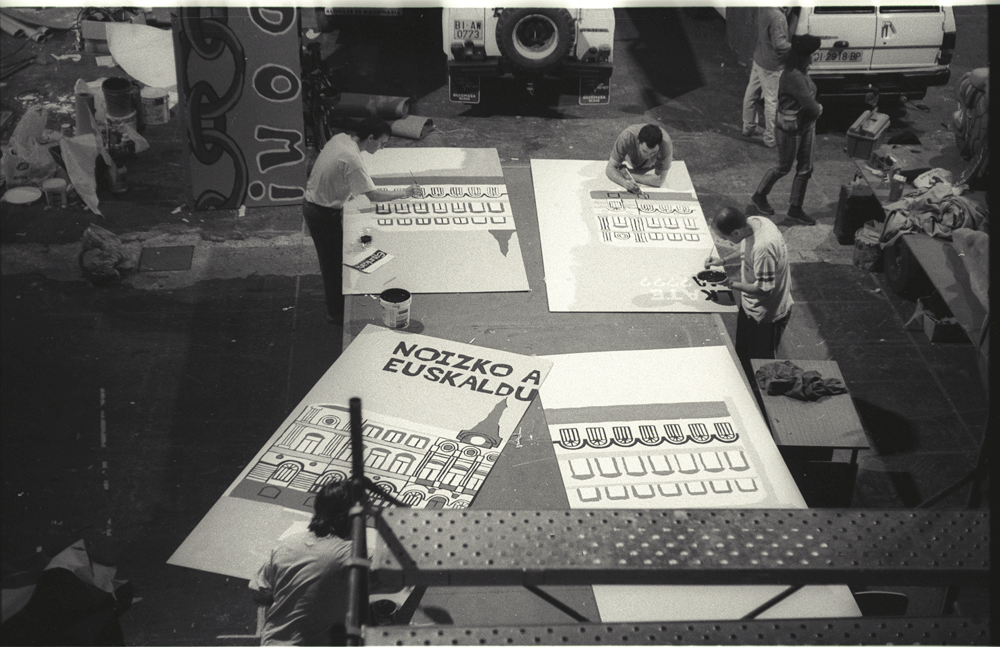Asier Mendizabal
Culturgest, Lisbon, Portugal
Culturgest, Lisbon, Portugal

Some of the more heart-sinking pronouncements an art critic is apt to encounter begin with phrases such as, ‘My work is all about…’ or, worse, ‘This work references…’. Too much current art tends to collapse under the weight of allusion it is forced to shoulder, before it can ever get going. One of the salutary features of the work of Basque artist Asier Mendizabal is the relative grace with which it bears just such a burden and the precise manner in which ramifying subject matter is given succinct formal articulation. The artist’s first solo outing in a public institution outside Spain, ‘and/or’ was a selection of work drawn from the past ten years or so, in which diverse source materials were enfolded into the orchestral embrace of a thoughtfully staged presentation. The mixed metaphoric implications of this description are not coincidental; rather they reflect the profusion of works in the show resembling stage sets, theatre flats, circus podia, photographic backdrops and festive banners, not to mention the makeshift platforms commonly found at political rallies.
The compelling nature of Mendizabal’s work is due to an instinctive feel for effective sculptural and graphic form, an understanding of the heraldic power of flags and emblems, however obscure, and the lingering significance of the well-wrought counter-cultural slogan or logo, however out of time. This is complemented by a wide-ranging familiarity with the history of radical cultural politics over the past century, ultimately grounded, no doubt, in the artist’s upbringing in a (sometimes violently) contested political milieu. His is an art in which the Utopian ideals of the early Soviet era may be invoked alongside the atavistic emblematics of West Coast American punk bands like Black Flag. This is all done in the belief, as the artist puts it, that ‘it is precisely in those local, applied discourses [...] that this unrepresentable longing for universality is enunciated with the greatest intensity and complexity.’
Evidence of the canny détournements of such localized discourses abounds. The series ‘Pabiliolia’ (Pavilion, 2002–3) shows a young group in an industrial garage preparing a carnival float. That the float will apparently be decked with placards decrying the Iraq war calls to mind one of the rallying cries of militant Basque separatism: ‘Jaiak bai borroka ere bai’ (Festival yes, but struggle too). Another photographic work, Otxarkoaga (M-L) (2007), depicts an unofficial monument, erected in the early 1990s in a public park in a working-class district of Bilbao, which comprises a pair of busts of Marx and Lenin, recovered from the Russian Embassy where they had been removed from view.
It is ironic that an exhibition so infused by the iconography of insurgency should be presented in a gallery housed in the imposing headquarters of one of Portugal’s biggest banks. The architecture of the gallery spaces devoted to Mendizabal’s work comprised two gently sloping ramps that mirrored each other and were joined by a short corridor. Off each of the ramps were three medium-sized unconnected rooms, the contents of which consequently tended to read as semi-autonomous capsules. Dispersed through these rooms were the constituent elements of one of the two works that symbolically drew the show together, while simultaneously amplifying the disjunctive energies at play throughout. Not All That Moves (Is Red) (2007) is made up of six outsized red and black flags, variously bisected horizontally, vertically or diagonally, each of which dominated the wall from which it was draped. Though the radical credentials of the colours black and red are considerable, the vexillological import of these banners was far from unambiguous. In a perverse way they provided the perfect dramatic background against which contrasting operations of passionate identification and de-identification, of opting in or opting out, might be performed. The other work that suffused the gallery spaces was the sound work Signals, Calls and Marches (2006), an anti-climactic, funereally protracted drum roll that was as dissipated a call to arms as might be imagined.
























